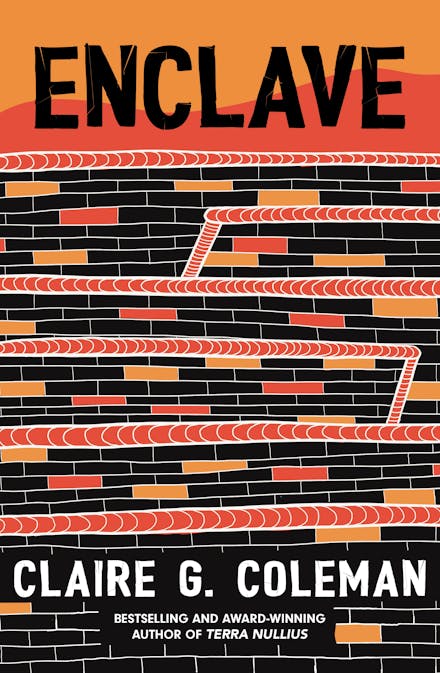 Reviewed by Magdalena Ball
Reviewed by Magdalena Ball
Enclave
By Claire G Coleman
Hatchette
Paperback, June 2022, ISBN: 9780733640865, $29.99
I seem to be reading a lot of dystopias lately. Perhaps I’m just in a dystopian frame of mind – there has been so much change in both the world and my life over the past year that this form of imagining just seems natural. Or maybe it’s because the end seems to be within sight and how else does one address it but with an imaginative response that engages? Claire G Coleman’s latest novel, Enclave, reads very much like a sci-fi dystopia. It’s contours are, like all good sci-fi novels, just at at the border of where we are now, chillingly familiar. The book opens like a cracked mirror to our modern society, but it’s not quite a dystopia. The key twist in the book is so good I will resist the urge to signal it, but there are many twists in the book, moving across a terrain which takes on any number of possible futures displayed simultaneously, with humour, precision, and a poetic grace so smooth it’s easy to glide over its surface on a first reading. The book’s protagonist is twenty-one year old Christine, the bored, privileged child of a high-ranking member of the all-powerful Agency. Christine’s needs are met by the army of silent, brown-skinned servants, and the ever watchful Alibaba-styled Safetynet, which tells her she needs a haircut, orders her clothing based on the latest fashions, picks out her musical tastes, and even does her social media posting, all while keeping track of her every move via a network of human and AI surveillance including an army of drones. It’s safe, but only if you follow the rules, keep to the centre line, and don’t slip. Christine’s best friend has disappeared, and when the story opens, she is beginning to slip. Safetytown is soulless and repressed, with a suburban feel of neat houses in off-white, off-cream and off-beige but Christine knows that outside of Safetytown is a terrifying apocalyptic world of crime, hunger, and death. The fear keeps her in line, for a while. Coleman’s writing is superb throughout, conveying character and setting with slick evocative prose:
Mother was already in the front passenger seat, showing no evidence of a hangover. She was as upright, uptight, fake bright, sweet-smelling, stiff-necked as always; hair perfect, clothes neat, glasses as dark as deep tannic pools, as the depths of the bottom of the ocean, as Christine’s mood. (18)
The false utopia of Safetytown calls to mind newspaper articles appearing regularly about the rich preppers buying bunkers to keep themselves safe against impending societal collapse from viruses, global warming catastrophes, war, and an influx of hungry, poor refugees. This all-too-real notion of the rich walling themselves off from the rest of humanity (if they don’t get to Mars on SpaceX with Elon first) rather than having to fix the problem is a key trope in the book which Coleman renders with brutal beauty, contrasting the bland and controlled sterility of Safetytown with the continuous news about the outside world:
People lay dead on the street; children were starving, skeletal naked. The Chairman of the Agency reassured them that their city was safe; all these things were happening elsewhere, outside. (71)
Enclave takes a cold eye to colonisation, racism, homophobia, and neoliberalism taken to its extreme in Safetytown. Though a lot of ground is covered, Coleman’s writing never feels strained, and though the morality is clear, there is never a hint of didacticism. Instead the story unfolds in all of its fast-paced glory through the eyes of Christine, whose narrative arc is believable and engaging. There have been comparisons between Coleman’s work and the world of Margaret Atwood, but a more immediate influence strikes me as Octavia E. Butler, whose writing reimagines society through the lens of identity and relationships, moving between humanity’s flawed past and its possible futures in a way that is more cyclical than linear, undermining the axioms that much of modern western society is built on. This is, to my mind, the crux of Coleman’s vision—that we are capable of better, and that there are pre-colonial models for this type of cooperative, egalitarian world outside of a binary that equates possession with a happiness predicated on comfort and a zero sum form of mass oppression. The careful deconstruction of Safetytown against a backdrop of scenarios drives the novel to its spectacular conclusion. Enclave is a powerful, chilling story that reads like poetry and progresses like an action novel.